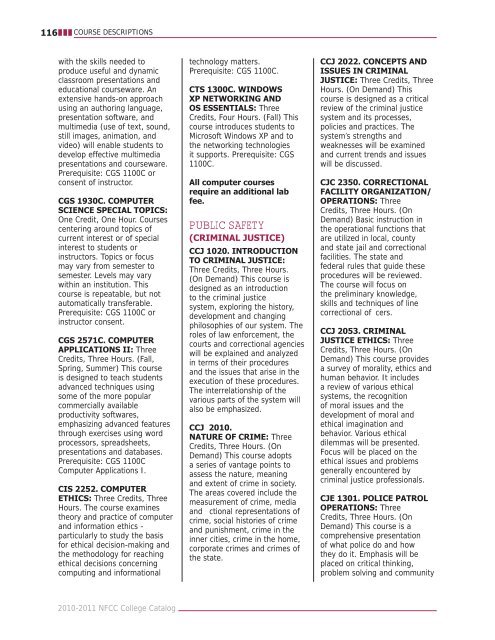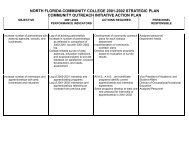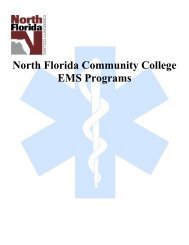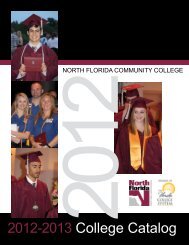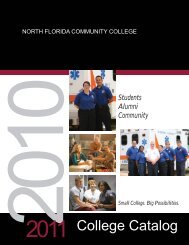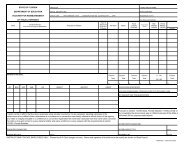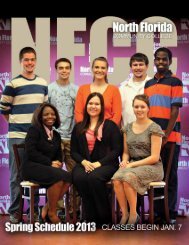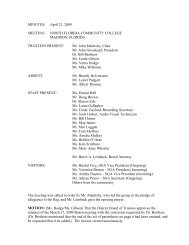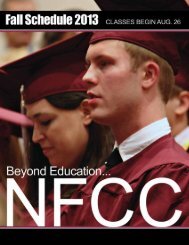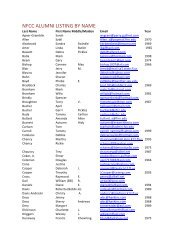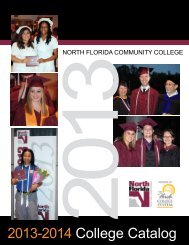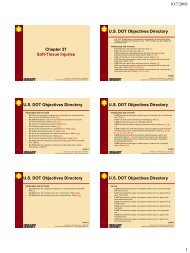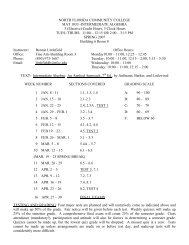2010-2011 College Catalog - North Florida Community College
2010-2011 College Catalog - North Florida Community College
2010-2011 College Catalog - North Florida Community College
Create successful ePaper yourself
Turn your PDF publications into a flip-book with our unique Google optimized e-Paper software.
116<br />
COURSE DESCRIPTIONS<br />
with the skills needed to<br />
produce useful and dynamic<br />
classroom presentations and<br />
educational courseware. An<br />
extensive hands-on approach<br />
using an authoring language,<br />
presentation software, and<br />
multimedia (use of text, sound,<br />
still images, animation, and<br />
video) will enable students to<br />
develop effective multimedia<br />
presentations and courseware.<br />
Prerequisite: CGS 1100C or<br />
consent of instructor.<br />
CGS 1930C. COMPUTER<br />
SCIENCE SPECIAL TOPICS:<br />
One Credit, One Hour. Courses<br />
centering around topics of<br />
current interest or of special<br />
interest to students or<br />
instructors. Topics or focus<br />
may vary from semester to<br />
semester. Levels may vary<br />
within an institution. This<br />
course is repeatable, but not<br />
automatically transferable.<br />
Prerequisite: CGS 1100C or<br />
instructor consent.<br />
CGS 2571C. COMPUTER<br />
APPLICATIONS II: Three<br />
Credits, Three Hours. (Fall,<br />
Spring, Summer) This course<br />
is designed to teach students<br />
advanced techniques using<br />
some of the more popular<br />
commercially available<br />
productivity softwares,<br />
emphasizing advanced features<br />
through exercises using word<br />
processors, spreadsheets,<br />
presentations and databases.<br />
Prerequisite: CGS 1100C<br />
Computer Applications I.<br />
CIS 2252. COMPUTER<br />
ETHICS: Three Credits, Three<br />
Hours. The course examines<br />
theory and practice of computer<br />
and information ethics -<br />
particularly to study the basis<br />
for ethical decision-making and<br />
the methodology for reaching<br />
ethical decisions concerning<br />
computing and informational<br />
technology matters.<br />
Prerequisite: CGS 1100C.<br />
CTS 1300C. WINDOWS<br />
XP NETWORKING AND<br />
OS ESSENTIALS: Three<br />
Credits, Four Hours. (Fall) This<br />
course introduces students to<br />
Microsoft Windows XP and to<br />
the networking technologies<br />
it supports. Prerequisite: CGS<br />
1100C.<br />
All computer courses<br />
require an additional lab<br />
fee.<br />
PUBLIC SAFETY<br />
(CRIMINAL JUSTICE)<br />
CCJ 1020. INTRODUCTION<br />
TO CRIMINAL JUSTICE:<br />
Three Credits, Three Hours.<br />
(On Demand) This course is<br />
designed as an introduction<br />
to the criminal justice<br />
system, exploring the history,<br />
development and changing<br />
philosophies of our system. The<br />
roles of law enforcement, the<br />
courts and correctional agencies<br />
will be explained and analyzed<br />
in terms of their procedures<br />
and the issues that arise in the<br />
execution of these procedures.<br />
The interrelationship of the<br />
various parts of the system will<br />
also be emphasized.<br />
CCJ <strong>2010</strong>.<br />
NATURE OF CRIME: Three<br />
Credits, Three Hours. (On<br />
Demand) This course adopts<br />
a series of vantage points to<br />
assess the nature, meaning<br />
and extent of crime in society.<br />
The areas covered include the<br />
measurement of crime, media<br />
and ctional representations of<br />
crime, social histories of crime<br />
and punishment, crime in the<br />
inner cities, crime in the home,<br />
corporate crimes and crimes of<br />
the state.<br />
CCJ 2022. CONCEPTS AND<br />
ISSUES IN CRIMINAL<br />
JUSTICE: Three Credits, Three<br />
Hours. (On Demand) This<br />
course is designed as a critical<br />
review of the criminal justice<br />
system and its processes,<br />
policies and practices. The<br />
system’s strengths and<br />
weaknesses will be examined<br />
and current trends and issues<br />
will be discussed.<br />
CJC 2350. CORRECTIONAL<br />
FACILITY ORGANIZATION/<br />
OPERATIONS: Three<br />
Credits, Three Hours. (On<br />
Demand) Basic instruction in<br />
the operational functions that<br />
are utilized in local, county<br />
and state jail and correctional<br />
facilities. The state and<br />
federal rules that guide these<br />
procedures will be reviewed.<br />
The course will focus on<br />
the preliminary knowledge,<br />
skills and techniques of line<br />
correctional of cers.<br />
CCJ 2053. CRIMINAL<br />
JUSTICE ETHICS: Three<br />
Credits, Three Hours. (On<br />
Demand) This course provides<br />
a survey of morality, ethics and<br />
human behavior. It includes<br />
a review of various ethical<br />
systems, the recognition<br />
of moral issues and the<br />
development of moral and<br />
ethical imagination and<br />
behavior. Various ethical<br />
dilemmas will be presented.<br />
Focus will be placed on the<br />
ethical issues and problems<br />
generally encountered by<br />
criminal justice professionals.<br />
CJE 1301. POLICE PATROL<br />
OPERATIONS: Three<br />
Credits, Three Hours. (On<br />
Demand) This course is a<br />
comprehensive presentation<br />
of what police do and how<br />
they do it. Emphasis will be<br />
placed on critical thinking,<br />
problem solving and community<br />
<strong>2010</strong>-<strong>2011</strong> NFCC <strong>College</strong> <strong>Catalog</strong>


